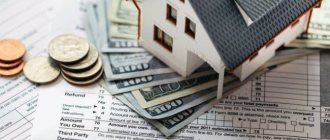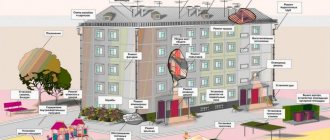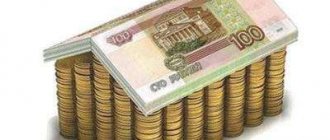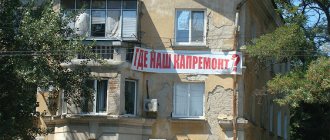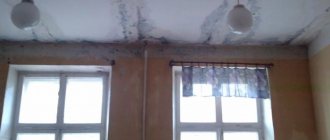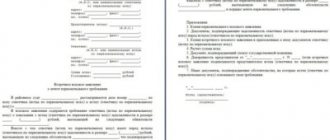Home » Buying and selling an apartment » Buying an apartment with debts for utility bills or major repairs
Despite the significant excess of supply over demand in the field of real estate sales, finding housing that is suitable in all respects can be quite difficult. And it often happens that the seller has serious debts on utility bills. Will such a problem be a reason for refusing to purchase and what are the features of purchasing such housing - read this article.
Are debts transferred when buying an apartment?
It all depends on the situation and the concluded sales agreement. If the seller has debts on utility bills, and he honestly reports this, you can try to negotiate a serious discount that exceeds the amount of the debt. This is beneficial for both the seller and the buyer:
- The seller gets rid of debts and can safely spend the money received from the sale on the purchase of a new home or any other needs.
- The buyer receives an apartment at a good discount.
But all of the above is true only on the condition that the buyer is ready to deal with debts and the seller does not hide them. Otherwise, the problems will mainly be with the seller, since a significant part of the utility debts is associated with the owner of the apartment, and not with the property itself. As a result, despite the sale of housing, the former owner will still, sooner or later, be forced to pay all his debts, including fines, penalties, and so on.
How to collect debt for major repairs from the previous owner. New judicial practice.
Many years of judicial practice have shown that Article 395 of the Civil Code of the Russian Federation (hereinafter referred to as Article 395 of the Civil Code of the Russian Federation) is widely applicable when considering civil cases. Often, such applicability depends on the low level of contractual work in civil relations and the dishonesty of the parties to the contract. This article was not only legal, but also a very convenient lever for protection against unscrupulous counterparties. Very often, Article 395 of the Civil Code of the Russian Federation is called “responsibility for the use of other people’s funds,” but its correct name is “responsibility for failure to fulfill a monetary obligation.” In the legal literature, the nature of this legal responsibility has always been defined differently. Some believed that Article 395 of the Civil Code of the Russian Federation provides for the accrual of interest as a measure for the use of funds (similar to interest on a loan agreement), others were sure that the article was a sanction for failure to fulfill monetary obligations. Considering this “universality” of forms of interpretation of liability permitted by law for a wide range of compensatory obligations, judicial practice in the Russian Federation is very multifaceted. And, probably, not a single article of the Civil Code of the Russian Federation can compete with the number of questions that arise when applying this article and establishing its relationship with other articles of the Civil Code of the Russian Federation and other norms of law. In relation to housing legal relations, in our article I would like to mention the rather recent Determination of the Investigative Committee on economic disputes of the Armed Forces of the Russian Federation dated October 12, 2020 No. 305-ES17-10359. The court overturned the previously adopted judicial acts and sent for retrial the case on the collection of interest for the use of other people's funds, since the plaintiff had the right to recover from the defendant, who untimely paid for services for the maintenance and current repairs of common property in apartment buildings, interest in the amount not exceeding the penalty established by law. In legal terms, the creditor has the right to recover from a person who has lately and (or) not fully paid for housing and utilities, the amount of a financial sanction in an amount not exceeding the amount of liability (penalties) established by Part 14 of Art. 155 of the Housing Code of the Russian Federation, including in the case when the creditor, in support of its claim, refers to the provisions of paragraph 1 of Art. 395 of the Civil Code of the Russian Federation. The Judicial Collegium of the Supreme Court of the Russian Federation sent the case for a new trial to the court of first instance on the following grounds: According to Part 2 of Art. 154 of the Housing Code of the Russian Federation, payment for residential premises and utilities for the owner of premises in an apartment building includes payment for the maintenance of residential premises, including fees for services, work on managing an apartment building, for the maintenance and current repairs of common property in an apartment building, for utility resources consumed during the use and maintenance of common property in an apartment building. A person to whom the premises in an apartment building are assigned the right of operational management, by virtue of the norms of the current civil and housing legislation, is obliged to bear the costs of paying for services rendered for the maintenance and repair of the common property of the apartment building. Part 14 art. 155 of the Housing Code of the Russian Federation (as amended in force until January 1, 2020) provides for the liability of a person who untimely and (or) did not fully pay for residential premises and utilities in the form of payment of penalties in the amount of one three hundredth of the refinancing rate of the Central Bank of the Russian Federation, valid on the day of actual payment, from amounts not paid on time for each day of delay starting from the next day after the due date for payment up to and including the day of actual payment; An increase in the amount of penalties established by this part is not allowed. These penalties, by their legal nature, are a legal penalty (Article 332 of the Civil Code of the Russian Federation). The absence of a properly executed contract with the person providing these services by the person obligated to bear the costs of paying for these services, by virtue of the current housing legislation, cannot lead to a refusal to satisfy claims for the collection of penalties. Revision of Art. 395 of the Civil Code of the Russian Federation, which was in force until June 1, 2020, did not contain a prohibition on collecting interest for the use of someone else’s money in the event that the law or agreement of the parties provides for a penalty for non-fulfillment or improper fulfillment of a monetary obligation. According to the practice of applying the norms of the Civil Code of the Russian Federation on liability for failure to fulfill a monetary obligation that developed before June 1, 2015, the creditor had the right to present a claim for the collection of a penalty established by law (by agreement of the parties) or a claim for the collection of interest from the debtor on the basis of Art. 395 of the Civil Code of the Russian Federation (clause 6 of the resolution of the Plenum of the Supreme Court of the Russian Federation and the Plenum of the Supreme Arbitration Court of the Russian Federation dated October 8, 1998 No. 13/14 “On the practice of applying the provisions of the Civil Code of the Russian Federation on interest for the use of other people’s funds” as amended up to March 24, 2016). Since in Part 14 of Art. 155 of the Housing Code of the Russian Federation states that it is impossible to increase the amount of the penalty established by this norm for late payment of payment for residential premises and utilities; the amount of interest for the use of other people's funds accrued on the amount of the debt should not exceed the amount of the legal penalty. The district arbitration court (previous instance) did not take into account the legal approach formulated in the Review of judicial practice of the Supreme Court of the Russian Federation No. 2 (2016), approved by the Presidium of the Supreme Court of the Russian Federation on June 6, 2020 (section “Law of Obligations”, issue No. 2), according to which, its incorrect legal qualification by the plaintiff, justifying his claim in paragraph 1 of Art. 395 of the Civil Code of the Russian Federation, while the law or agreement of the parties provides for a penalty in this case; in this case, the court has the right to recover interest within the amount of the penalty subject to recovery by virtue of law or contract. Taking into account the above, the court decided that the plaintiff has the right to demand recovery from the defendant, who untimely paid for services for the maintenance and routine repairs of common property in the apartment building, interest in an amount not exceeding the penalty established by Part 14 of Art. 155 Housing Code of the Russian Federation. Applying the concept of Article 395 of the Civil Code of the Russian Federation to the activities of lawyers, it is obvious that only the lazy did not mention it in their works. In practice, courts have to adapt to set out in their decisions a broad concept of the rules provided for in Article 395 of the Civil Code of the Russian Federation and correctly establish their legal relationship with other rules of law. The definition of the Supreme Court of the Russian Federation set out in the article linked the provisions of the civil and housing codes of the Russian Federation, indicated the limit of liability provided for in Part 14 of Article 15 of the RF Housing Code, even if the creditor refers to the provisions of Clause 1 of Article 395 of the Civil Code of the Russian Federation.
What debts are transferred when buying an apartment?
When purchasing an apartment, based on Article 153 of the Housing Code of the Russian Federation and Article 169 of the Housing Code of the Russian Federation, the buyer will be obliged to pay only the debt that has accumulated on payments for major repairs. This is certainly unpleasant, but the amount of such monthly payments is much less than payment for heating, water supply, sewerage, electricity, and so on. All listed utilities must be paid by the person who incurred the debt.
Example : Let's assume that the seller of the apartment did not pay for utilities in principle. The amount of 100 thousand rubles has accumulated, of which 5 thousand rubles are major repairs. This man is selling his apartment and hopes that the new owner will pay off all the debt. But he is wrong. Based on legal requirements, for each new owner the calculation of utility bills starts from zero, with the exception of payments for major repairs. As a result, the new owner will be required to pay only 5 thousand of the debt for this overhaul, and the previous owner will have to pay the rest of the amount.
Most housing offices and management companies prefer to ignore legal requirements and demand payment of debts from the new owner. From their point of view, this is quite logical, if only simply because they have no way to track down the previous owner, and the legal proceedings can drag on for many years. The new owner, in turn, does not have to pay at all. It is enough to indicate that he bought the apartment and is not obliged to answer for the debts of the previous owner. And if the management company continues to put pressure, he will even go to court. Usually this is enough.
Debt for major repairs is purchased along with the apartment
It happens that after purchasing an apartment, it turns out that this apartment has a debt to pay contributions for major repairs. The buyer has a lot of questions about who should pay off the debt and where to go.
Typical example:
An apartment was purchased on the secondary market through a Sberbank mortgage; the documents were verified only by Sberbank itself. Three months later, it turns out that this apartment has a debt for major repairs in the amount of 40 thousand rubles.
This is what paragraph 3 of Art. 158 of the Housing Code of the Russian Federation:
The obligation to pay the costs of major repairs of common property in an apartment building applies to all owners of premises in this building from the moment the ownership of the premises in this building arises. When the ownership of premises in an apartment building is transferred to the new owner, the obligation of the previous owner to pay the costs of major repairs of common property in the apartment building, including the obligation not fulfilled by the previous owner to pay contributions for major repairs, is transferred to the new owner, with the exception of such an obligation not fulfilled The Russian Federation, a subject of the Russian Federation or a municipal entity that is the previous owner of premises in an apartment building.
That is, if the apartment did not belong to the state before the new owner, then the debt to pay contributions for major repairs that the former owner of the apartment accumulated goes to the new owner of the apartment.
In such a situation, you need to understand the difference between fees for major repairs and utility costs. The debt to pay for utilities remains with the previous owner of the apartment; the new owner can receive only the debt for major repairs with the purchased apartment.
It turns out that when buying an apartment on the secondary housing market, the buyer himself must find out whether this apartment has debts for major repairs. You can request receipts from the seller or obtain information from the management company.
If the buyer of the apartment did not do this, then it is actually considered that he agreed to buy the apartment with accumulated debt. Perhaps this was the reason to get a discount.
Much may depend on the terms of the purchase and sale agreement. It may state that there is no debt and the seller of the apartment is responsible for this. It may be directly stated that in accordance with paragraph 3 of Art. 158 of the Housing Code of the Russian Federation, the buyer accepts the apartment with the obligation of the previous owner to pay the costs of major repairs of common property in the apartment building.
You can go to court with a claim for termination of the contract, in accordance with Art. 450 of the Civil Code of the Russian Federation, in connection with significant violations of the contract by the seller, again, if there is a clause in the contract that can be “caught on”.
If it was not possible to terminate the contract, after repaying the debt, you can subsequently collect this debt from the previous owner of the apartment, but only through the court, by way of recourse. To do this, you will need to provide evidence that the debt accumulated before the purchase and sale transaction.
There is only one conclusion and it is simple - in order to avoid unnecessary problems, it is necessary to check the apartment for the presence of arrears in payment of contributions for major repairs of common property in an apartment building.
Who pays debts for utilities when buying an apartment
Here everything again depends on what is said in the contract. Perhaps the seller will ask the buyer for a certain amount in advance with an obligation to pay off all outstanding utility bills. In this case, it seems like the seller pays, but the buyer gives him the money for this.
If the parties have not agreed on anything and the issue of paying utility bills was not raised in the purchase and sale agreement, then the seller will pay, regardless of whether he wants it or not.
How to check an apartment when buying for debts
There are several main ways to check for debts in an apartment before concluding a purchase and sale agreement. Let's take a closer look at each of them.
Certificate of debt
The simplest, and therefore the most popular, way is to request a certificate of debt from the management company or housing office. It is recommended to require such a document from the real estate seller. Even if he refuses, this will indirectly indicate possible problems.
In theory, you can try to personally contact the management company or housing office, emphasizing that the buyer will be purchasing this property and should be aware of all possible problems. They may refuse, or they may agree to a meeting. It is almost impossible to predict in advance what exactly the housing office will say.
Online services
Also in many cities there are special online information services. On these portals, information about debts on utility bills is publicly available. Alternatively, you can search for the same data on the management company’s website or even request it electronically.
Debt for major repairs from the previous owner 2020
An apartment is not a cheap purchase, so when concluding a transaction you should not rely on the honesty and decency of its owner. Judicial practice shows a lot of excitement around this issue - new owners, after paying a large sum, discover the fact of fraud, while the culprit is rarely found. Another common problem is debt for major repairs from the previous owner. The reason for falling for any of the tricks regarding property issues is the buyer’s negligence in checking all the documents. Without examining documents, checking all receipts, or trusting the recommendations of friends, you can irrevocably lose your money.
Property legal relations are regulated by the norms and provisions of the “Housing Code of the Russian Federation” dated December 29, 2004 No. 188-FZ, as amended and supplemented. Starting from January 2013, homeowners in apartment buildings are required to pay for funds spent on major repairs. It is calculated based on the square footage of the premises registered with the owner.
Paragraph 3 of Article 158 of the RF Housing Code regulates two scenarios for the development of events:
- Obligations to pay the debt are assigned to the owner of the property, regardless of when they arose. That is, the new owner who bought the property from an individual who owes money to the state for major repairs is obliged to pay them himself.
- If the previous owner was a government body or a subject of the Russian Federation, a municipal or public entity, the debt obligations will not be transferred to the new owner. If he decides not to risk it and pays the debts owed by the state or municipality, then the entire amount is transferred to the account for future payments.
Note: if the debt for utility resources used for normal life - electricity, gas, water, heat and electricity is registered with the person, and will not be transferred to the new owner, then unpaid payments for major repairs belong to the apartment, that is, debts for major repairs are transferred to a new owner.
In order not to have to go to court with an application against your predecessor to collect debts from him for major repairs, it is worth carefully checking how regularly he paid for the services for the maintenance of common property in the apartment building in which his apartment was located.
Before concluding a purchase and sale agreement, you must request:
- The seller has receipts confirming that he has paid all contributions for major repairs in the prescribed amount. On the day of sale, the owner should not have any debt.
- The paying agent, homeowners association or management company has a statement of the personal account of the owner who decided to sell the property. It reflects all debts. The potential buyer has the right to request such documents.
Note: if the new management company began to fulfill its obligations after the registration of ownership of the property by the seller, the relevant documents must be requested from its predecessor. This will delay the process, but the buyer will be able to make sure that there are no debts and avoid problems in the future.
In some regions of Russia, an online service has already been launched that allows you to track information whether receipts for utilities and major repairs have been paid at a specific address. This system speeds up the process, because there is no need to wait until the documents are sent to the manager by mail.
Sometimes the seller unknowingly leaves such debts, forgetting in the hustle and bustle to pay the receipts received in recent months. This issue can often be resolved amicably by showing a certificate issued by the HOA or management company, which confirms that the bills were not paid for the period when the seller was registered as the owner of the apartment. Conscious citizens make such payments voluntarily; the matter does not come to court proceedings.
Next, you should find out whether it is possible to sell an apartment with a debt for major repairs. It is relevant both for unscrupulous sellers and for buyers who are careless in checking all documents and receipts. The question is clear - such a possibility exists, and the debts are transferred to the new owner of the apartment along with the property.
In order to somehow protect yourself and be able to legally recover the appropriate amount from the seller, you must:
- In the purchase and sale agreement, include a clause obliging the seller to provide receipts confirming the fact of payment for major repair services for the entire period of ownership of the property.
- Request receipts. Even if the seller provides fake documents, it will be easier for the buyer to prove his case in court.
Having bought an apartment with debt for major repairs, you should know how not to incur additional expenses after purchasing the property. Having the above documents in hand, you can safely go to court. In this case, it is advisable to pre-pay off the debts and demand full compensation from the previous owner.
Note: if we are talking about a small amount of debt, and the previous owner refused to pay it voluntarily, it is not always advisable to go to court. You will have to spend a lot of time and effort, as well as pay legal fees.
The following are exempt from payments for major repairs:
- residents of emergency housing;
- owners of apartments in multi-storey buildings subject to demolition;
- owners of property located on a land plot seized by state or municipal authorities.
The legislation provides for subsidies for disabled people and unemployed pensioners. To register it in 2020, you will have to confirm that the owner of the property belongs to one of these categories.
Experts recommend: to avoid problems after the purchase, you should make sure that there is no debt for major repairs when selling the apartment, and also check the authenticity of all other documents.
From the video you can learn about the debt for major repairs to the new owner:
Attention! Due to recent changes in legislation, the legal information in this article may be out of date!
Our lawyer can advise you free of charge - write your question in the form below:
The obligation to pay contributions for major repairs is established by the Housing Code of the Russian Federation and arises from the owner of premises in an apartment building after 6 months from the date of inclusion of the house in the regional program. Owners of premises in apartment buildings are required to pay monthly contributions for major repairs of common property.
This is interesting: How long does it take to privatize an apartment in 2020
Since February 2020, the Capital Repair Fund of the Moscow Region has been working to collect debt on contributions for capital repairs and reconcile previously paid payments by owners.
Residents could have arrears in paying contributions for major repairs for several reasons, including:
— the subscriber did not pay bills,
- receipts for payment of fees did not arrive,
— the paying agent did not transfer paid contributions to the Capital Repair Fund and/or did not provide reports on payments made.
Currently, based on the identified facts of non-receipt of funds and failure to provide reports on payments made, the Fund is conducting a legal audit and accounting reconciliation.
In order to avoid cooperation with unscrupulous companies, from January 1, 2020, the Capital Repair Fund of the Moscow Region terminated contractual relations with all agents in the region and transferred the authority to accrue, collect and process contributions to a single agent - MosObleIRTs. MosObleIRC calculates contributions based on data received from the Fund, receives and serves the population.
To collect past debts in the Ramensky district, the Capital Repair Fund of the Moscow Region entered into an agreement with Zhilishchnik-PRO LLC.
This organization, on behalf of the Fund, began to carry out actions that do not contradict the legislation of the Russian Federation, necessary and sufficient for debt collection.
In order to provide the opportunity to timely repay the debt in a pre-trial manner, to eliminate the cost of paying penalties and legal costs, organizations authorized by the Fund began delivering debt documents (notifications-claims) to defaulters in February 2020. The documents reflect the amount of debt calculated by the Capital Repair Fund of the Moscow Region, as well as the Fund’s details for making payment.
Please note.
The payment documents received by owners from MosOblEIRTs LLC indicate current accruals and, if any, debt for previous periods from the date the house was included in the agreement between the Fund and MosObleIRTs LLC .
The debt documents received by owners from collection companies indicate the debt incurred from the date the house was included in the regional program .
In the event that the data of the Capital Repair Fund of the Moscow Region on debt does not correspond to the data on previously paid contributions, the owner is recommended to contact Zhilishchnik-PRO LLC by phone to adjust the accruals. After preliminary reconciliation of payments by telephone, receipts confirming the fact of payment must be sent to the email specified in the debt notification:
After reconciliation and confirmation of the fact of payment, appropriate changes will be made to the personal account: the payer will either be excluded from the register of debtors, or a debt document with a specified amount of debt will be sent to his address.
Payment of current payments for major repairs is carried out through a single agent, MosObleIIRTS LLC, to the details of MosObleIIRTS or the Fund (in case of payment through the personal account of MosObleIIRTS, no banking commission is charged).
Payment of debt for previous periods is carried out EXCLUSIVELY to the Fund’s details. Payment details are indicated in the debt document, on the website of the Capital Repair Fund of the Moscow Region, and are also available from MosObleIRTs managers in the client offices of the settlement center.
Also, please note that, according to paragraph 3 of Article 158 of the RF Housing Code:
“The obligation to pay the costs of major repairs of common property in an apartment building applies to all owners of premises in this building from the moment the ownership of the premises in this building arises. When the ownership of premises in an apartment building is transferred to the new owner, the obligation of the previous owner to pay the costs of major repairs of common property in the apartment building, including the obligation not fulfilled by the previous owner to pay contributions for major repairs, is transferred to the new owner, with the exception of such an obligation not fulfilled The Russian Federation, a subject of the Russian Federation or a municipal entity that is the previous owner of premises in an apartment building.
(Part 3 as amended by Federal Law dated July 29, 2017 N 257-FZ)"
Many years of judicial practice have shown that Article 395 of the Civil Code of the Russian Federation (hereinafter referred to as Article 395 of the Civil Code of the Russian Federation) is widely applicable when considering civil cases. Often, such applicability depends on the low level of contractual work in civil relations and the dishonesty of the parties to the contract. This article was not only legal, but also a very convenient lever for protection against unscrupulous counterparties. Very often, Article 395 of the Civil Code of the Russian Federation is called “responsibility for the use of other people’s funds,” but its correct name is “responsibility for failure to fulfill a monetary obligation.”
In the legal literature, the nature of this legal responsibility has always been defined differently. Some believed that Article 395 of the Civil Code of the Russian Federation provides for the accrual of interest as a measure for the use of funds (similar to interest on a loan agreement), others were sure that the article was a sanction for failure to fulfill monetary obligations. Considering this “universality” of forms of interpretation of liability permitted by law for a wide range of compensatory obligations, judicial practice in the Russian Federation is very multifaceted. And, probably, not a single article of the Civil Code of the Russian Federation can compete with the number of questions that arise when applying this article and establishing its relationship with other articles of the Civil Code of the Russian Federation and other norms of law.
The Judicial Collegium of the Supreme Court of the Russian Federation sent the case for a new trial to the court of first instance on the following grounds:
According to Part 2 of Art. 154 of the Housing Code of the Russian Federation, payment for residential premises and utilities for the owner of premises in an apartment building includes payment for the maintenance of residential premises, including fees for services, work on managing an apartment building, for the maintenance and current repairs of common property in an apartment building, for utility resources consumed during the use and maintenance of common property in an apartment building. A person to whom the premises in an apartment building are assigned the right of operational management, by virtue of the norms of the current civil and housing legislation, is obliged to bear the costs of paying for services rendered for the maintenance and repair of the common property of the apartment building.
This is interesting: Commercial proposal of management companies 2020
Part 14 art. 155 of the Housing Code of the Russian Federation (as amended in force until January 1, 2016) provides for the liability of a person who untimely and (or) did not fully pay for residential premises and utilities in the form of payment of penalties in the amount of one three hundredth of the refinancing rate of the Central Bank of the Russian Federation, valid on the day of actual payment, from amounts not paid on time for each day of delay starting from the next day after the due date for payment up to and including the day of actual payment; An increase in the amount of penalties established by this part is not allowed. These penalties, by their legal nature, are a legal penalty (Article 332 of the Civil Code of the Russian Federation).
The absence of a properly executed contract with the person providing these services by the person obligated to bear the costs of paying for these services, by virtue of the current housing legislation, cannot lead to a refusal to satisfy claims for the collection of penalties.
Revision of Art. 395 of the Civil Code of the Russian Federation, which was in force until June 1, 2020, did not contain a prohibition on collecting interest for the use of someone else’s money in the event that the law or agreement of the parties provides for a penalty for non-fulfillment or improper fulfillment of a monetary obligation. According to the practice of applying the norms of the Civil Code of the Russian Federation on liability for failure to fulfill a monetary obligation that developed before June 1, 2015, the creditor had the right to present a claim for the collection of a penalty established by law (by agreement of the parties) or a claim for the collection of interest from the debtor on the basis of Art. 395 of the Civil Code of the Russian Federation (clause 6 of the resolution of the Plenum of the Supreme Court of the Russian Federation and the Plenum of the Supreme Arbitration Court of the Russian Federation dated October 8, 1998 No. 13/14 “On the practice of applying the provisions of the Civil Code of the Russian Federation on interest for the use of other people’s funds” as amended up to March 24, 2016).
Since in Part 14 of Art. 155 of the Housing Code of the Russian Federation states that it is impossible to increase the amount of the penalty established by this norm for late payment of payment for residential premises and utilities; the amount of interest for the use of other people's funds accrued on the amount of the debt should not exceed the amount of the legal penalty. The district arbitration court (previous instance) did not take into account the legal approach formulated in the Review of judicial practice of the Supreme Court of the Russian Federation No. 2 (2016), approved by the Presidium of the Supreme Court of the Russian Federation on June 6, 2020 (section “Law of Obligations”, issue No. 2), according to which, its incorrect legal qualification by the plaintiff, justifying his claim in paragraph 1 of Art. 395 of the Civil Code of the Russian Federation, while the law or agreement of the parties provides for a penalty in this case; in this case, the court has the right to recover interest within the amount of the penalty subject to recovery by virtue of law or contract.
Taking into account the above, the court decided that the plaintiff has the right to demand recovery from the defendant, who untimely paid for services for the maintenance and routine repairs of common property in the apartment building, interest in an amount not exceeding the penalty established by Part 14 of Art. 155 Housing Code of the Russian Federation. Applying the concept of Article 395 of the Civil Code of the Russian Federation to the activities of lawyers, it is obvious that only the lazy did not mention it in their works. In practice, courts have to adapt to set out in their decisions a broad concept of the rules provided for in Article 395 of the Civil Code of the Russian Federation and correctly establish their legal relationship with other rules of law. The definition of the Supreme Court of the Russian Federation set out in the article linked the provisions of the civil and housing codes of the Russian Federation, indicated the limit of liability provided for in Part 14 of Article 15 of the RF Housing Code, even if the creditor refers to the provisions of Clause 1 of Article 395 of the Civil Code of the Russian Federation.
And if the purchase and sale agreement stipulates that the seller pays for all utilities, including major repairs
Hello! Please consult. I purchased an apartment, a week later I received a receipt for major repairs in the name of the previous owner with arrears. The previous owner refuses to pay and never paid at all. Is it possible to recover this amount through the court? Or recalculate payments due to a change of owner? Attached is also a file of one of the clauses of the purchase and sale agreement.
Article 158. Expenses of owners of premises in an apartment building [Housing Code of the Russian Federation] [Article 158]
3. The obligation to pay the costs of major repairs of an apartment building applies to all owners of premises in this building from the moment the ownership of the premises in this building arises. When the ownership of premises in an apartment building is transferred to the new owner, the obligation of the previous owner to pay the costs of major repairs of the apartment building, including the obligation not fulfilled by the previous owner to pay contributions for major repairs, is transferred.
Is it possible to recover this amount through the court? Galina
Quite possible. The burden of maintaining the property always lies with the owner.
Hello, Article 158. Expenses of owners of premises in an apartment building [Housing Code of the Russian Federation] [Article 158] Nikolaeva Olga Romanovna
Yes, formally you will most likely have to pay, but this amount can therefore be claimed from the former owner.
Did he provide you with a certificate of absence of debt for housing and communal services before signing the contract?
According to Article 158 of the Housing Code of the Russian Federation, upon transfer of ownership rights, all responsibilities for maintaining the property are transferred, incl. and for cap. repair. You will not be able to recover from the former owner; the court will refuse you.
Article 210. Burden of maintaining property [Civil Code of the Russian Federation] [Chapter 13] [Article 210] The owner bears the burden of maintaining the property belonging to him, unless otherwise provided by law or contract.
Article 158 of the Housing Code of the Russian Federation Expenses of owners of premises in an apartment building 3. The obligation to pay expenses for major repairs of an apartment building applies to all owners of premises in this building from the moment ownership of the premises in this building arises. When the ownership of premises in an apartment building to the new owner, the obligation of the previous owner to pay the costs of major repairs of the apartment building, including the obligation not fulfilled by the previous owner to pay contributions for major repairs, is transferred.
This is interesting: Conversion of apartments into residential premises 2020
The rest of the bills are for water, utilities, etc. have been paid and receipts submitted.
In accordance with Art. 158 of the Housing Code of the Russian Federation, the debt for major repairs passes to the new owner:
When the ownership of premises in an apartment building is transferred to the new owner, the obligation of the previous owner to pay the costs of major repairs of the apartment building, including the obligation not fulfilled by the previous owner to pay contributions for major repairs, is transferred.
Therefore, you, as the new owner, are obliged to pay this debt.
Article 158 specifically about major repairs says the opposite. The new owner will have to pay.
Alas, no, because... when ownership rights are transferred, the debts of the former owner are also transferred
When the ownership of premises in an apartment building is transferred to the new owner, the obligation of the previous owner to pay the costs of major repairs of the apartment building, including the obligation not fulfilled by the previous owner to pay contributions for major repairs, is transferred.
In accordance with Art. 158 Housing Code of the Russian Federation, you will have to pay. And then collect from the seller.
3. The obligation to pay the costs of major repairs of an apartment building applies to all owners of premises in this building from the moment ownership of the premises in this building arises. When ownership of premises in an apartment building is transferred to the new owner, the obligation of the previous owner to pay the costs for major repairs of an apartment building, including the obligation not fulfilled by the previous owner to pay contributions for major repairs.
The norm is of course extremely strange, taking into account the provisions of Art. 153 of the Housing Code of the Russian Federation, according to which the owner pays for maintenance from the moment ownership rights arise. But it still exists and this norm has not been challenged.
I read all the laws, in my opinion, they are unfinished. It’s just that enough time has passed since this innovation and I would like to know if there are any loopholes or won cases, how to recover this amount back after payment?
Other com. You pay for services from the date of receipt of ownership. Only in relation to major repairs is the rule that the entire debt is paid by the new owner.
You are not required to pay these expenses, since the repairs were made before you became the owner of this purchased apartment and the seller of the apartment, that is, the former owner, must pay for it. That is, contractual relations arose only after the acceptance of ownership.
There have been no major renovations yet; this house will only be renovated in 15 years! PROBABLY)))
What does contractual relations have to do with it? There is a direct indication in Art. 158 Housing Code of the Russian Federation.
Unfortunately, Article 158 of the Housing Code of the Russian Federation applies only to major repairs, but housing and communal services from the moment they became the owner
I read all the laws, in my opinion, they are unfinished. It’s just that enough time has passed since this innovation and I would like to know if there are any loopholes or won cases, how to recover this amount back after payment? Galina
I haven’t found exactly such a practice, but I would try to collect it as unjust enrichment.
Article 1102. Obligation to return unjust enrichment
1. A person who, without the grounds established by law, other legal acts or transaction, acquired or saved property (acquirer) at the expense of another person (victim), is obliged to return to the latter the unjustly acquired or saved property (unjust enrichment), except for the cases provided for in Article 1109 of this Code.
That is, in fact, the obligation to pay the cap. The previous owner had the repairs done, but he didn’t do it and you had to pay for it.
An analogy can be drawn according to the following. court. decision
Meanwhile, S., having acquired, in accordance with Article 36 of the Housing Code of the Russian Federation, the right of common shared ownership of the common property of an apartment building, created at the expense of the personal funds of the owners of residential premises, avoided bearing the costs of creating this property in proportion to the share of the residential premises belonging to her. In accordance with Article 1102 of the Civil Code of the Russian Federation, a person who, without grounds established by law or transaction, acquired or saved property at the expense of another person, is obliged to return to the latter the unjustly acquired or saved property (unjust enrichment). The defendant, by evading payments for the completion of the house, established by the decision of the general meeting, saved her own funds, as a result of which the property was created without taking into account the contributions of S. Since the funds associated with this purpose were actually spent by the HOA "Kareltseva 105", which entered into the corresponding contracts and those who made payments, the requirements of the HOA “Kareltseva 105” to S. are legitimate.
Since the funds associated with this purpose were actually spent by the housing cooperative "Fifth House", which entered into the relevant agreements and made payments, the requirements of the housing cooperative "Fifth House" to K.V. about recovery in accordance with Art. 1102 of the Civil Code of the Russian Federation, costs not reimbursed by the defendant for completing the construction of the house in the amount of **** rubles. are legal.
to our lawyers - it’s much faster than looking for a solution.
»
Other
At whose expense is the installation of common house metering devices carried out? 2020
Read more
Other
Replacing a sewer riser in an apartment: who should repair it, statement 2020
Read more
Other
How to get rid of condensation on cold water pipes? 2020
Read more
Great article 0
The procedure for purchasing an apartment with housing and communal services debts
The procedure for purchasing a home with housing and communal services debts is practically no different from purchasing ordinary real estate.
Sequencing
Procedure for purchasing an apartment with housing and communal services debts:
- Search for an apartment . If you specifically need housing with debts (for example, to negotiate a discount), you need to look for exactly this information, but in practice, this is rarely reported in advertisements.
- Negotiations with the seller . If the seller informs you about the debts in advance, it is recommended to discuss this issue separately. It is advisable to immediately agree on how debts will be reflected in the purchase and sale agreement. If they were not mentioned or it is directly stated that the debt remains with the previous owner, then the seller will pay. But if the contract says that the buyer will have to pay off the entire debt, then he will have to pay. But, of course, the apartment under such conditions will be sold at a discount.
- Request documents for housing . This must include a certificate from the management company or housing office.
- Inspect the apartment . This is also a mandatory step, thanks to which the buyer can make sure that the property really matches the description. Although this point relates directly to debts very indirectly. The only exception: if the debts for the “utilities” are already so large that the seller’s gas supply, water, electricity, and so on were cut off. In such a situation, the problem will be more serious, since you will have to put pressure on the management company or housing office so that all communications are connected after the change of owner. And this is quite difficult and can take a long time.
- Draw up a purchase and sale agreement . The parties agree on specific terms individually. If necessary, you will need to include previously agreed upon items on utility debts.
- Register the agreement . It does not have to be certified by a notary, but it must be registered.
- Register ownership of housing . Immediately after this, if you do not plan to pay off debts and, especially if some communications are disconnected, you need to contact the management company or housing office, demanding that everything be charged from scratch from such and such a date and that all utilities be returned to their place.
- Sign the transfer and acceptance . Based on this document, the actual fulfillment of the terms of the contract is carried out. If the buyer does not plan to repay the debt, then at this stage you can remind the seller that all previous debts remain. At the same time, you need to remember that the new owner is not obliged to help the management company find the debtor in any way.
- Require the seller to provide a receipt for the full amount for the apartment . It is this document, together with the acceptance certificate, that closes the transaction (usually the act and receipt are signed almost simultaneously). The receipt is written only by the seller and, usually, it is provided in one copy. The seller does not keep it for himself. Unless he wants a copy for himself.
Documentation
For purchase and sale transactions, the following documents are required:
- Passports of the buyer and seller (from the buyer - this is the only document required, unless the seller requests confirmation of solvency).
- Extract from the Unified State Register of Real Estate . Replaces a certificate of ownership. It tends to become outdated, so it is advisable to request the most recent statement before making a transaction.
- Certificate from the management company or housing office . This document just indicates the presence or absence of debts. It is not mandatory, but if the seller refuses to provide it, the buyer should immediately become suspicious.
- Extract from the house register . Indicates persons who are registered in the apartment. It is highly recommended to require that everyone registered is checked out before the transaction is completed. If adults can then be discharged without any problems by a court decision, then it is impossible to discharge minors in the same way.
- Registration certificate for the apartment . By comparing the actual appearance of the property with the plan in the technical passport, you can check whether the seller has carried out unauthorized redevelopment. This can be a serious problem.
- Permission to sell housing from the guardianship authorities . This is only relevant if one of the sellers of the apartment (co-owner) is a minor.
- Consent of the spouse to sell the home . This document is relevant if the seller is married. Formally, under some conditions, an apartment may be personal property and such consent will not be required, but in practice, proving this is much more difficult than providing the said consent.
Depending on the terms of the transaction and other features, additional documents may be required from the seller and/or buyer.
Expenses
The costs that arise when selling an apartment are usually borne by the seller, not the buyer. However, the parties can agree that all costs are divided in one ratio or another between the parties. For example, the seller pays 70% of all expenses, and the buyer pays the remaining 30%. Or, let’s say, the buyer bears all the costs, and in return the seller makes a discount on housing in one amount or another.
An approximate list of allowable expenses that may arise when buying or selling an apartment:
| Type of expenses | Cost amount |
| Home Valuation Report | From 2 thousand rubles |
| Real estate agency services | From 2% of the cost of the apartment |
| Fresh extract from the Unified State Register of Real Estate | 350 rubles |
| New technical passport | From 10 thousand rubles |
| Notarization of the contract | From 5 thousand rubles |
| Notarial consent of the spouse | From 1 thousand rubles |
| State fee for registration of property rights | 2000 rubles for each new owner |
In addition to all of the above, it is logical that the buyer is obliged to pay for the apartment itself. It is possible to pay part of the amount in advance (usually about 5-10% of the total price). Also, if the parties agree that the buyer pays debts for utilities, these costs will also need to be taken into account.
Deadlines
The timing largely depends on the contracting parties, the need to urgently sell or buy an apartment and many other factors. A sample list would look like this:
- Search for housing: from 1 day to several years (on average, a current offer is usually found within 1-2 months)
- Negotiations with the seller: individually, usually up to 1 month.
- Receiving and studying the required documents: from 1 week to 1 month.
- Drawing up a purchase and sale agreement: from 1 day.
- Registration of property rights: from 1 week.
- Communication with the management company or housing office about clearing the new owner’s debt and connecting cut off communications: from 1 day to six months.
On average, the entire transaction, from finding a seller to communicating with the management company, takes about 2-3 months. There are more and less, but significantly less. Under ideal conditions, this can be done in literally 1-2 weeks, but all parties must be very interested in this.
Debts on utility bills when buying an apartment are, of course, a problem, but far from the most serious and largest. There are still a huge number of risks and controversial situations, which are almost impossible to understand on your own. Experienced lawyers will tell you about the main similar situations during a free consultation. They can accompany the entire transaction, thereby eliminating almost all problems and risks.
FREE CONSULTATIONS are available for you! If you want to solve exactly your problem, then
:
- describe your situation to a lawyer in an online chat;
- write a question in the form below;
- call Moscow and Moscow region
- call St. Petersburg and region
Save or share the link on social networks
(
1 ratings, average: 5.00 out of 5)
Author of the article
Natalya Fomicheva
Website expert lawyer. 10 years of experience. Inheritance matters. Family disputes. Housing and land law.
Ask a question Author's rating
Articles written
513
- FREE for a lawyer!
Write your question, our lawyer will prepare an answer for FREE and call you back in 5 minutes.
By submitting data you agree to the Consent to PD processing, PD Processing Policy and User Agreement
Useful information on the topic
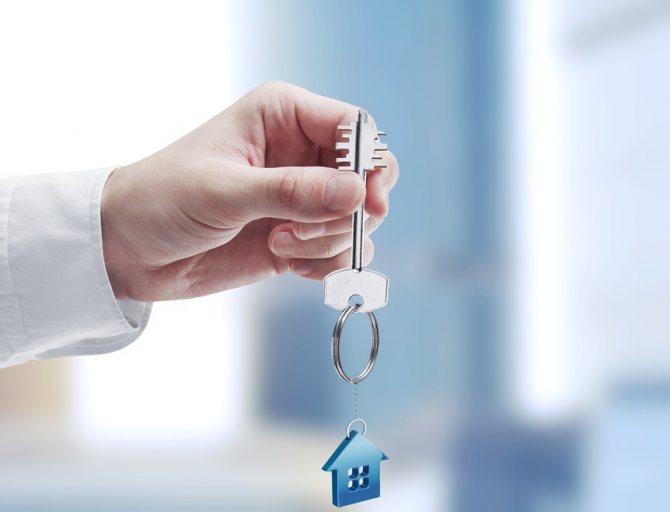
2
Do you need a realtor when buying and selling an apartment?
Buying and selling an apartment are dangerous transactions. Despite…

3
Buying an apartment for minors from 14 to 18 years old
Buying an apartment for minors is a fairly common occurrence. Exactly like this...
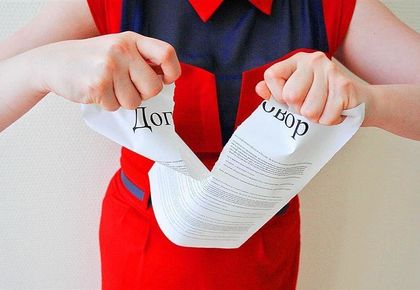
26
Termination of the apartment purchase and sale agreement
The desire to terminate the purchase and sale agreement (SPA) of an apartment may arise for various reasons...

12
Consent to purchase an apartment from a spouse
A significant part of the property of the spouses is considered jointly acquired, with...

8
Title insurance when purchasing an apartment
When buying an apartment, one of the most popular types of insurance is…
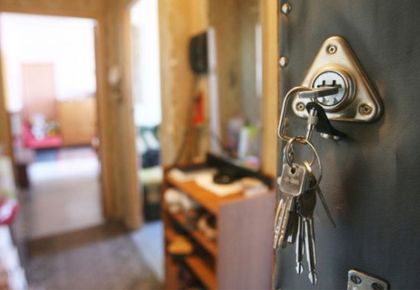
20
What you need to know when buying an apartment on the secondary market
Before purchasing an apartment on the secondary market, you need to know the procedure for concluding...
Who doesn't pay for major repairs in 2020
In accordance with paragraph 2 of Art. 169 of the Housing Code of the Russian Federation, owners who are exempt from paying for major repairs include:
- owners of real estate located in houses recognized as unsafe and subject to demolition;
- residents of houses with less than 3 apartments;
- tenants of housing under a social tenancy agreement;
- citizens who have received social benefits - pensioners, disabled people, large families.
In some regions of the Russian Federation, residents of new houses less than 3-5 years have passed since the building was put into operation . The grace period is set separately by each region.
After the deferment period ends and the house is included in the regional capital repair program, residents will be required to begin making contributions.
Receive a discount on cap payments. low-income families can make repairs . To do this, citizens must apply for a subsidy to pay contributions for major repairs and housing and communal services, if payments for utilities exceed a certain share in the total family income . The size of the income share is established separately in each subject of the Russian Federation. Compensation issued in this way will cover only part of the costs; the rest must be paid by citizens themselves.
Should a pensioner pay for major repairs?
A subject of the Russian Federation has the right to establish for pensioners who have reached the age of 70 years , compensation for paying contributions for major repairs in the amount of 50% (clause 2.1 of Article 169 of the Housing Code of the Russian Federation). A citizen will receive a benefit if:
- he is a non-working pensioner who has reached the age of 70;
- registered in the apartment and lives in it alone ;
- is a non-working owner of the premises and lives as part of a family consisting of non-working citizens who have reached retirement age.
Compensation is provided only for one apartment , which is owned by a pensioner - if he is the owner of several real estate properties, the benefit can only be used to pay for major repairs of one of the apartments.
A pensioner under 70 years of age can also receive a benefit in paying contributions if:
- He is a disabled person of groups I and II or has a disabled person in his care.
- Received or suffered radiation sickness or another disease as a result of the disaster at the Chernobyl nuclear power plant or work to eliminate the consequences of radiation exposure.
- Applies to veterans and disabled combatants, disabled people and participants of the Second World War, as well as members of their families.
- He is a Hero of the USSR or the Russian Federation, a full holder of the Order of Glory.
Compensation is paid to the beneficiary monthly , until the first day of the month following the month in which the obligation to pay the capital contribution is fulfilled. repair. The payment is transferred to a bank account or issued in cash.
Payment for major repairs by pensioners over 80 years of age (law)
Pensioners who have reached the age of 80 have the right not to pay for major repairs . By decision of the regional authority, they may be provided with a benefit of 100% . The conditions for receiving benefits are exactly the same as for pensioners under 80 years of age.
However, in order to receive the benefit and stop paying for major repairs, the pensioner owner registered in the apartment must live alone or together with a pensioner entitled to the same benefit. If this condition is not met, no compensation will be provided . For example, if a relative who has not reached retirement age is registered with a pensioner in an apartment.
